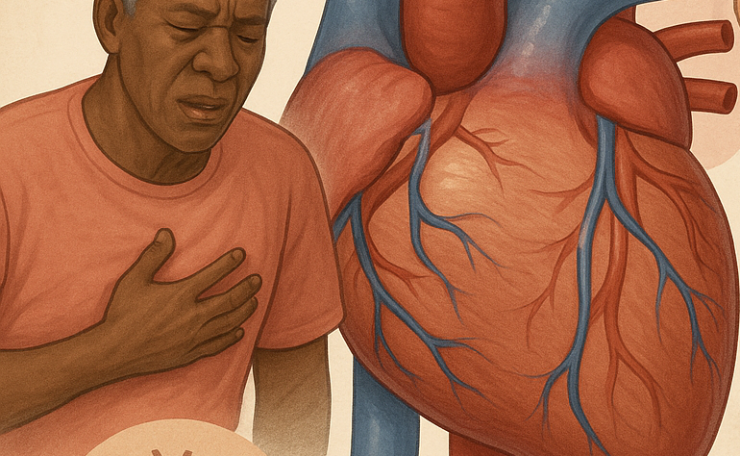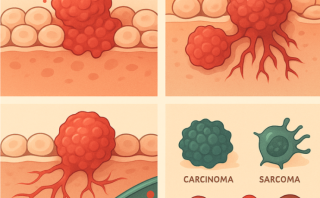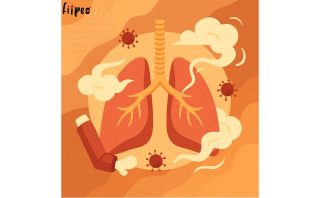Heart failure is a serious health condition, but with the right knowledge and care, people living with it can still lead satisfying lives. Let’s break down what heart failure really means, its causes, symptoms, and ways to manage it.
What Is Heart Failure?
Heart failure doesn’t mean your heart has stopped working. Instead, it means your heart isn’t able to pump blood as effectively as it should. Blood and oxygen may not reach all parts of your body as needed, which can lead to symptoms and health complications.
About 7 million Americans suffer with heart failure, and it’s a leading reason for hospital visits in people over the age of 65. One in four people will be diagnosed with it during their lifetime.
What Happens in Heart Failure?
When your heart weakens or gets too stiff, your body tries to adapt. The heart may stretch to hold more blood, or the muscle walls may thicken—all in an effort to keep enough blood flowing. Over time, these changes don’t help and can actually make things worse. Blood backs up, pressure rises, and fluid can build up in your arms, legs, lungs, or other organs—a problem called congestive heart failure.
It’s important to note that heart failure is different from a heart attack. A heart attack happens suddenly, often due to a blood clot blocking blood flow to the heart muscle. In contrast, heart failure usually develops over months or years as the heart gradually weakens.
What Causes Heart Failure?
Various conditions can harm your heart and lead to heart failure, including:
- Coronary Artery Disease (CAD): Plaque builds up in arteries, restricting blood flow to the heart.
- Heart Attack: Sudden blockage cuts off blood supply, damaging heart muscle.
- Cardiomyopathy: Problems with the heart muscle due to genes, infections, alcohol, or drug use.
- Overworked Heart: High blood pressure, valve diseases, thyroid or kidney issues, diabetes, or birth defects can all increase your risk.
Sometimes, a combination of these factors is responsible.
What Are the Symptoms of Heart Failure?
Symptoms can range from mild to severe and may come and go. Some people notice nothing at first. Here are early warning signs :
- Tiredness or Fatigue: Feeling unusually tired, even after rest.
- Shortness of Breath: Especially when active or lying down.
- Coughing or Wheezing: Often caused by fluid in the lungs.
- Swelling: Usually in ankles, legs, or abdomen due to fluid buildup.
- Difficulty with Activities: Everyday tasks may become tiring.
Types of Heart Failure
Heart failure can affect different parts of the heart and is often classified based on function:
- Left-Sided Heart Failure: The left ventricle, the main pumping chamber, loses strength or flexibility.
- Systolic (Reduced ejection fraction): The heart can’t squeeze hard enough.
- Diastolic (Preserved ejection fraction): The heart can’t relax and fill properly.
- Right-Sided Heart Failure: Often follows left-sided heart failure; impacts the right side, affecting blood flow to the lungs.
How Is Heart Failure Diagnosed?
Doctors will review your medical history, ask about your symptoms, and perform a physical exam. They may order tests such as:
- Blood Tests: Check organ function and hormone levels.
- BNP Blood Test: High BNP levels indicate heart stress.
- Chest X-ray: Shows heart size and fluid.
- Echocardiogram: Ultrasound to see heart movement and structure.
- EKG: Measures electrical activity of the heart.
- Cardiac Catheterization or Stress Test: To evaluate heart function and blood flow.
How Is Heart Failure Treated?
Heart failure treatment is all about slowing the disease, easing symptoms, and improving quality of life.
Early on, lifestyle changes are key:
- Achieving a healthy weight
- Regular exercise (as advised by your doctor)
- Low-sodium diet
- Quitting smoking
- Managing stress and getting enough sleep
Doctors may prescribe medicines such as:
- ACE inhibitors or ARBs (relax blood vessels)
- Beta blockers (slow heart rate)
- Diuretics (reduce fluid)
- Other medications to improve heart function
In more advanced cases, procedures or devices can help
- Surgery: For blocked arteries or faulty valves
- Implanted Devices: For correcting heart rhythm or assisting pumping
- Heart Transplant: In very severe cases
Some conditions that cause heart failure can be reversed, especially if treated early or if the underlying cause (like an infection or lifestyle factor) is addressed.
Stages and Severity
Heart failure progresses in stages, from those who are at risk (with high blood pressure or diabetes) to people with advanced symptoms. Your treatment plan will depend on which stage you’re in and how severe your symptoms are.
Ways to Slow Heart Failure and Prevent Further Damage
Here’s how you can protect your heart:
- Control blood pressure and blood sugar
- Monitor weight and swelling for signs of fluid buildup
- Limit fluids and salt (if advised)
- Keep all doctor appointments and don’t skip medications
- Stop smoking and limit alcohol
- Stay active but don’t overdo it—pace yourself
Managing other conditions like kidney disease is also crucial, since your heart and kidneys affect each other closely.
Medications to Avoid
Some drugs can worsen heart failure. Talk to your doctor before taking:
- Nonsteroidal anti-inflammatory drugs (like ibuprofen or naproxen)
- Certain heart rhythm drugs
- Some calcium channel blockers
- High-salt supplements or antacids
- Cough/cold medicines with pseudoephedrine
Improving Your Quality of Life
Daily habits can make a huge difference:
- Follow a heart-healthy diet: Lots of fruits, vegetables, fiber; low in salt, sugar, and unhealthy fats.
- Keep physically and socially active, as much as you’re able.
- Protect yourself from infections—get vaccinated as recommended.
- Seek support if you feel overwhelmed. Talking to friends, family, or a support group can help.
Surgery and Advanced Treatments
In some cases, surgery or devices such as left ventricular assist devices (LVADs) or heart transplants become necessary. These are usually reserved for people with severe heart failure who aren’t helped by medications and lifestyle changes.
When to Seek Emergency Care
Call 911 or go to the emergency room if you experience:
- New, severe chest pain with shortness of breath, sweating, or nausea
- Rapid heartbeat (especially over 120 beats per minute) and shortness of breath
- Difficulty breathing that doesn’t go away with rest
- Sudden weakness, trouble moving arms or legs, or fainting
What’s the Outlook?
Many people with heart failure live fulfilling lives with proper treatment. Survival depends on the severity of your condition and how closely you follow your treatment plan. About half of people with heart failure live at least five years after diagnosis.
It’s also important to plan for the future. Discuss your wishes for medical care with your loved ones and doctor in case you can’t make decisions later on.
Key Takeaways
- Heart failure is common, but manageable.
- Know and watch for symptoms , the earlier it’s caught, the better it can be treated.
- Follow your doctor’s advice and treatment plan to protect your heart and quality of life.
- Make healthy lifestyle choices , no smoking, stay active, eat well, and keep stress low.
- Don’t be afraid to ask for help or reach out for support.
Sources
For more in-depth information, visit:
- WebMD – Heart Failure Guide
- American Heart Association – Heart Failure
- CDC – Heart Failure Facts
- Mayo Clinic – Heart Failure
Understanding heart failure and your options puts you in the driver’s seat. With teamwork and a positive outlook, living well with heart failure is absolutely possible.
Disclaimer: This content is for informational purposes only and does not constitute medical advice. Always consult with a qualified healthcare professional for diagnosis, treatment, and personalized guidance.



